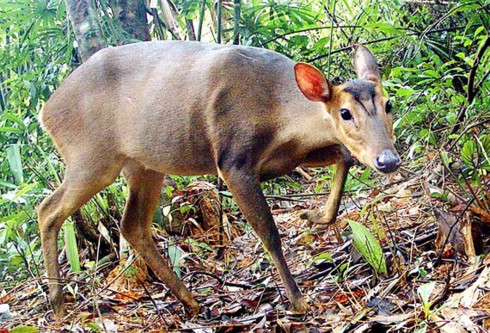
A camera trap has caught the large-antlered muntjac, one of the rarest and most threatened mammal species of Southeast Asia, for the first time in the central province of Quang Nam.
 |
| The mammal is classified as a rare and endangered animal in the red book. |
A camera trap has caught the large-antlered muntjac, one of the rarest and most threatened mammal species of Southeast Asia, for the first time in the central province of Quang Nam.
The provincial Forest Protection Department said on May 23 that the photographs captured two individuals, a male and a female, which are both mature and of reproductive age.
They were taken in November last year as part of a biodiversity monitoring and assessment supported by the World Wild Fund Vietnam (WWF–Vietnam), US Agency for International Development (USAID), the Leibniz Institute for Zoo and Wildlife Research (Leibniz-IZW) and local authorities.
“Large-antlered muntjacs do not currently exist in captivity, so if we lose them in the wild, we lose them forever. Scientists are racing against time to save the species. Addressing the snaring crisis to protect wildlife in the forests of central Vietnam and setting up captive assurance populations are vital if we are to succeed,” said Benjamin Rawson, Conservation Director of the WWF–Vietnam.
The muntjac, which was first discovered in central Ha Tinh Province in 1994, is endemic to evergreen forests in the Truong Son (Annamite) Mountains bordering Vietnam and Laos. The rare animal has been found in protected areas in the central province of Thua Thien–Hue in 2013 and in the central province of Thanh Hoa in 2016.
The deer has been absent for years due to illegal snare hunting. In 2016, in response to the snare-driven decline of the species, the status on the IUCN Red List of Threatened Species of the large-antlered muntjac was changed from Endangered to Critically Endangered.
This discovery marks a milestone for the biodiversity conservation as it provides new hope for the continued survival of an endangered species in Vietnam.
The survey team is now expanding camera trapping efforts to other areas in the region, including places with high biodiversity potential in Thua Thien–Hue and the north of Quang Nam.
(Source: VNA)





